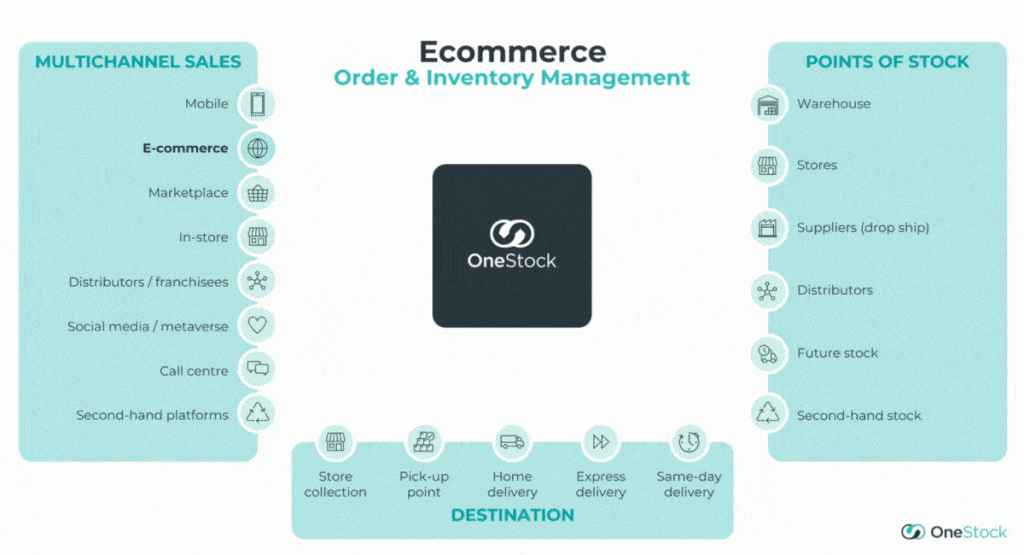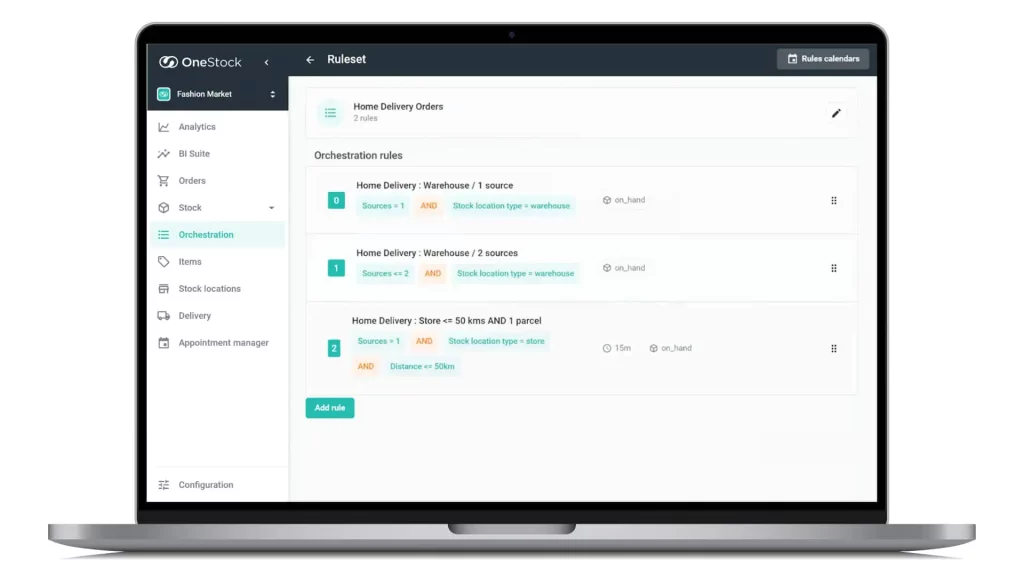
The art of ecommerce fulfilment: beyond shipping and delivery
Ecommerce has transformed the way consumers shop, making convenience and accessibility paramount. However, behind every successful online purchase lies a complex and intricate process known as ecommerce fulfilment. This article explores the world of ecommerce fulfilment, its fundamental aspects, the role of technology, core pillars of efficiency, digital integration, challenges and solutions, sustainability initiatives, real-world case studies, and the intricacies of navigating global markets.
As an OMS provider, OneStock helps organisations to unravel the art of ecommerce fulfilment and to go beyond customers expectations in terms of shipping and delivery.
Table of contents
A primer on what ecommerce fulfilment entails
The convergence of tech & logistics in fulfilment
Core pillars of efficient ecommerce fulfilment
Streamlined warehousing: the backbone of ecommerce
Rapid & accurate order processing techniques
The nuances of inventory control in ecommerce
Embracing digital in fulfilment
The role of ecommerce platforms & integrations
Analytics and predictive modelling for stock management
Robotics and AI: the future facets of fulfilment
Challenges in ecommerce fulfilment & how to overcome them
Balancing cost-effective shipping with customer expectations
Managing returns without losing revenue
Tackling seasonal peaks and fluctuating demands
Sustainability in ecommerce fulfilment
Green packaging & environmentally-conscious practices
Ethical supply chains in the digital age
Case studies: brands mastering ecommerce fulfilment
Innovators in the space: who’s leading and why?
Lessons from common mistakes & success stories
Navigating ecommerce fulfilment in global markets
Customs, duties and cross-border complexities
The promise of localised fulfilment centres
Ecommerce fulfilment unveiled
A primer on what ecommerce fulfilment entails
Ecommerce fulfilment is the entire process of managing a customer order, from the moment they place their order online to the point when they receive their purchase.
The process of ecommerce fulfilment involves various stages, each playing a crucial role in ensuring that customers receive their orders accurately and on time:
- Order management: Ecommerce fulfilment begins with order management, encompassing the receipt and processing of customer orders. This stage involves essential tasks such as order verification, payment processing and inventory assessment.
- Inventory management: A cornerstone of effective fulfilment, inventory management demands meticulous attention. It necessitates the maintenance of accurate and up-to-date inventory records. Specialised inventory management systems play a vital role in monitoring product availability and preventing inventory imbalances like overstocking or stockouts.

- Picking and packing: Upon order receipt, the process of item selection, secure packaging and proper labeling ensues. The choice of packaging materials and techniques is paramount, as it influences shipping costs and sustainability concerns.
- Shipping and delivery: A critical component of fulfilment is the thoughtful selection of shipping carriers, efficient optimisation of shipping routes and steadfast commitment to timely deliveries. Providing customers with tracking information is essential for transparency and efficient customer service.
- Returns management: The management of returns is an integral facet of ecommerce fulfilment. It entails the selection of a return method by the customer followed by the thorough inspection of returned items, processing of refunds or exchanges and seamless reintegration of returned items into inventory.
This process serves as the foundational framework underpinning the success of any direct-to-consumer venture, profoundly impacting customer satisfaction and loyalty.
The convergence of tech & logistics in fulfilment
Ecommerce fulfilment is where technology and logistics intersect. Advancements in technology have revolutionised the industry, enabling businesses to meet the growing demands of online shoppers efficiently.
From automation to data analytics, technology plays a pivotal role in shaping the future of fulfilment. Order Management Systems utilise this technology to enable real-time inventory management, omnichannel order processing, enhanced order accuracy and improved customer experiences.
This offers a number of benefits, including faster order processing, improved operational efficiency, decreased carrying costs, reduction of overstock, scalability of operations and data-driven decision-making, leading to better planning and cost management.
Core pillars of efficient ecommerce fulfilment
Streamlined warehousing: the backbone of ecommerce
Ecommerce and retail businesses often deal with a wide range of products and high inventory turnover. Streamlined warehousing enables these businesses to keep track of inventory levels and locations in real-time, ensuring the right products are in stock and available for order fulfilment.
This requires the integration of various sales channels, including websites, stores, marketplaces and resellers, as well as stock locations, such as warehouses, stores, suppliers and dropshippers. Streamlined warehousing systems like an Order Management System allows businesses to manage orders from multiple sources seamlessly. This integration prevents overselling and ensures consistent customer experiences.
Rapid & accurate order processing techniques
Efficient order processing is key to the success of any ecommerce business. This is directly related to real-time inventory management, which allows businesses to process orders while maintaining accurate and up-to-date stock levels.
Then order orchestration comes into play, using intelligent algorithms to automatically route orders to the most suitable stock location for fulfilment, considering factors like product availability, proximity to the customer, environmental impact and shipping costs.
The nuances of inventory control in ecommerce
Effective inventory management is a delicate balancing act. Overstocking ties up capital and space unnecessarily, while understocking can lead to lost sales and disappointed customers.
Real-time tracking, demand forecasting and automated replenishment systems help businesses maintain the optimal inventory levels and ensures that products shown as available on the website or for Order in Store orders are indeed in stock.
Embracing digital in fulfilment
The role of ecommerce platforms & integrations
Ecommerce platforms serve as the digital storefronts for businesses. Seamlessly integrating these platforms with an Order Management System (OMS) ensures that product listings, pricing and availability are always up-to-date, enhancing the customer experience.
It’s essential to select an ecommerce platform that aligns with your business needs and growth objectives. Consider scalability, customisation and integration processes. Implementing third-party integrations, including an OMS, CRM, payment gateways, carriers and analytics tools, can enhance your fulfilment processes.
Analytics and predictive modeling for stock management
Data-driven decision-making is essential in ecommerce fulfilment, and analytics and predictive modeling can provide valuable insights into customer behaviour and demand patterns.
OneStock’s advanced analytics and Business Intelligence Suite can significantly enhance efficiency, thanks to:
- Data collection and integration: Centralised data from various stock locations provide a clear view of inventory levels, stock turnover, preparation times and order statuses.
- Advanced analytics: Pre-built and customised reports and data analysis can help in building predictive modelling and demand forecasting.
Robotics and AI: the future facets of fulfilment
The future of ecommerce fulfilment will be driven by robotics and artificial intelligence.
Robotics will streamline warehouse fulfilment processes through developments in automated picking and packing, and improve inventory management, using RFID and cameras to conduct real-time inventory checks and manage stock levels more accurately. These warehouse optimisations will be combined with AI to optimise order routing and shipping decisions.
Order Management Systems can utilise AI in demand forecasting, inventory planning and trend prediction to improve order processing workflows, inventory management and customer communication processes. AI can also support in the identification of pain points and their swift resolution.
Challenges in ecommerce fulfilment and how to overcome them
Balancing cost-effective shipping with customer expectations
Ecommerce businesses often grapple with the delicate balance of meeting customer expectations for fast, reliable and affordable delivery. The challenge lies in minimising shipping costs while ensuring timely and transparent delivery.
The solution? OneStock’s intelligent order orchestration.
OneStock OMS offers an intelligent order orchestration or routing system that optimises order fulfilment decisions. By considering factors such as proximity to the customer, carrier costs and delivery times, businesses can choose the most cost-effective shipping option for each order without compromising customer satisfaction. Real-time inventory visibility and integration with multiple shipping carriers enable businesses to make informed decisions, ultimately striking the right balance.

Managing returns without losing revenue
Returns are an inevitable part of ecommerce and handling them efficiently is crucial. Inefficient returns processes can lead to lost revenue and customer dissatisfaction.
The solution? OneStock’s streamlined returns management.
OneStock OMS streamlines the returns process, making it easier for customers to initiate returns and for businesses to process them quickly and accurately. Efficient returns management includes automated return authorisation, thorough inspection of returned items and seamless restocking of inventory. By managing returns effectively, businesses can retain customers and minimise revenue loss.
Tackling seasonal peaks and fluctuating demands
Ecommerce businesses often experience significant fluctuations in demand, especially during seasonal peaks. Meeting this fluctuating demand efficiently without overstocking or stockouts is a complex task.
The solution? OneStock’s inventory optimisation and demand forecasting.
OneStock OMS leverages advanced demand forecasting and inventory optimisation tools powered by AI and machine learning. By analysing historical sales data, market trends and customer behaviour, businesses can predict demand accurately and maintain optimal stock levels. This enables them to meet seasonal peaks with confidence, prevent overstock situations and minimise costs.
Sustainability in ecommerce fulfilment
Green packaging & environmentally-conscious practices
Sustainability is a growing concern for both businesses and their customers, and adopting environmentally-conscious practices throughout the fulfilment process can significantly reduce a company’s carbon footprint and waste.
Many ecommerce businesses are rethinking the packaging materials used to ship orders, opting for recycled cardboard, paper or plastics to reduce the demand for new resources and minimise the energy required for production, or biodegradable packaging, which decomposes faster to reduce long-term pressure on landfills. Selecting lightweight packaging materials can also lower transportation costs and reduce the energy required for shipping, leading to a smaller carbon footprint.
An Order Management System plays a crucial role in supporting sustainability in ecommerce fulfilment. It optimises stock levels to reduce overstock, which can lead to excess waste, or understock, which can result in expedited shipping and higher carbon emissions due to rush deliveries. An OMS can also optimise shipping routes to reduce the fuel consumption and carbon emissions associated with deliveries, and streamline the returns process to ensure items are efficiently restocked to minimise waste.
Ecommerce businesses can further reduce the waste from their operations by implementing take-back programmes, which allow customers to return unwanted packaging and products for reuse or recycling. Some even offer incentives to ensure valuable resources remain in use and out of landfill.
Ethical supply chains in the digital age
Consumers today are increasingly concerned about the ethical implications of their purchases. As supply chains become more complex, with third parties involved at various stages of production, it becomes increasingly difficult for ecommerce businesses to control and monitor how their inventory is produced and transported. However, developments in order management technology, such as blockchain integration, is continuing to enhance traceability in supply chains to ensure fair labour practices and responsible sourcing.
Case studies: brands mastering ecommerce fulfilment
Innovators in the space: who’s leading and why?
Pets at Home: the world’s best omnichannel pet care business
The UK’s leading pet care business has implemented fulfilment processes that enable staff to pick, pack and ship ecommerce orders in just 30 minutes. This means that Pets at Home customers can place an order online and pick it up from a store in as little as one hour, or have it delivered to their door in two hours. The brand’s focus on fast fulfilment is closely aligned with its customers’ needs: when pet owners need food or essential accessories, they want to access them as quickly as possible in order to care for their pet.
ManoMano: a great delivery promise on an international level
As a DIY marketplace, ManoMano’s orders are shipped to customers from a network of over 2,500 merchants, with fulfilment methods and times varying depending on the location of both the merchant and the customer. To simplify the customer experience, ManoMano has implemented split baskets, and in doing so, is delivering customer convenience to rival ecommerce giants like Amazon. When products with different suppliers are added to a basket, customers can select their preferred fulfilment method and the associated delivery promise for each item.
Lessons from common mistakes & success stories
Learning from others’ mistakes can be just as valuable as studying success stories. Common mistakes in ecommerce fulfilment include:
- Poor inventory management: Ecommerce brands have faced unprecedented supply chain disruptions in recent years and are now dealing with overstock from delayed shipments. Complete and accurate inventory visibility, including future stock that is on order or in transit, ensures that businesses can sell through stock faster and at full-price, even without stock on hand.
- Inadequate customer communication: Even with the best laid plans, delivery delays can happen and when they do, customers will be more forgiving to brands who are transparent in their communications. Automatic notifications to let the customer know their order is delayed, with a new estimated time of arrival, will reduce pressure on customer service teams.
- Robust logistics networks: Ecommerce logistics networks have also experienced a number of recent interruptions through strike action. When businesses rely on a single logistics provider, this can put a halt to fulfilment and result in order delays and cancellations. By integrating your order management system with multiple carriers, you can build resilience into your fulfilment network.
Navigating ecommerce fulfilment in global markets
Ecommerce has transcended borders, offering businesses unprecedented opportunities to reach global audiences. However, this expansion brings its own set of complexities and challenges in ecommerce fulfilment.
Customs, duties and cross-border complexities
One of the foremost challenges in global ecommerce fulfilment is navigating customs regulations and duties. Every country has its own set of rules and taxes, making cross-border shipping complex and costly.
OneStock simplifies customs clearance and duty calculations. Thanks to technology partners, our OMS handles the intricacies of cross-border shipping, including accurate calculation of duties and taxes. By automating these processes, businesses can ensure compliance with customs regulations and provide customers with transparency regarding any additional charges. This reduces shipping delays and ensures a smooth international shopping experience.
The promise of localised fulfilment centers
Global customers have diverse preferences and expectations. To meet these expectations, businesses need to localise their fulfilment operations to ensure faster shipping times and reduced costs.
OneStock enables businesses to use their local store network as mini fulfilment centres strategically placed around the world. Intelligent order orchestration directs orders to the customer’s nearest stock location, ensuring optimal delivery times and costs. By embracing localised fulfilment, businesses can enhance the customer experience, build trust and remain competitive in global markets.
The global market dynamic
Expanding into global markets introduces a level of complexity that requires a deep understanding of local customer preferences, regulatory frameworks and cultural nuances.
OneStock’s OMS is designed with customer behaviour in mind. Thanks to all our collected data, it empowers businesses with insights into local market dynamics, enabling them to adapt their product offerings, pricing and marketing strategies accordingly. By harnessing these insights, businesses can connect with global audiences on a personal level, creating meaningful and culturally relevant shopping experiences.
In conclusion, ecommerce fulfilment is a multifaceted process that goes far beyond shipping and delivery. It involves technology, logistics, digital integration, sustainability and global market strategies. As ecommerce continues to evolve, mastering the art of fulfilment is crucial for businesses aiming to thrive in the digital age.


